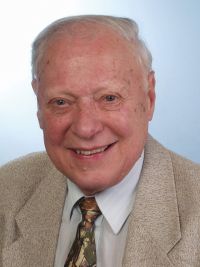BECQUEREL PRIZE
European Becquerel Prize for Outstanding Merits in Photovoltaics
The European Becquerel Prize for Outstanding Merits in Photovoltaics is being awarded on the occasion of the EU PVSEC Conference. This prize was established by the European Commission in 1989 to mark the 150th anniversary of Alexandre-Edmond Becquerel’s discovery of the photovoltaic effect in 1839, which laid the foundation of both, photovoltaics and photography.
Congratulations!

Dr. Gunter Erfurt
Chief Executive Officer of Meyer Burger Technology AG,
Chairman for Meyer Burger Research AG
Becquerel Prize Winner 2023 Keynote Speech:
"Re-establishing of advanced manufacturing of silicon solar cells and modules in Europe" (PDF)
Gunter Erfurt is the winner of the 2023 Alexander Edmond Becquerel Prize.
Dr. Gunter Erfurt receives the award for his engagement in re-establishing advanced manufacturing of silicon solar cells and modules in Europe, with his company Meyer Burger. Gunter Erfurt has lead the transformation of the company from an equipment supplier to a main European producer of solar cells and modules, ramping up highly automatized proprietary manufacturing solutions for silicon heterojunction technology with smart-wire contacting, all this under the constraint of the COVID crisis. He has been a tireless advocate for a renaissance of PV production in Europe, giving numerous talks in conferences, taking part in debates, and contributing in the media. He also regularly represented the industry in many meetings with the institutions in Europe where he became truly the “face” and "voice" for more local manufacturing. Through his actions, positions, and leadership, Dr. Erfurt is an outstanding individual in the community.
The awardee received his Phd in Physics from TU Freiberg, Germany in 2003. Then, he joined Solarworld, where he occupied various positions in USA and Germany, including as director of Solarworld Innovations. In 2015 he moved to become a director of Meyer Burger Germany, before being appointed group CTO in 2017 and CEO since April 2020. He serves on the scientific or advisory board of several institutes and associations.
The official prize ceremony took place during the opening session of the 40th European Photovoltaic Conference, which is taking place from 18 – 22nd September 2023 in Lisbon.
On behalf of the Becquerel Prize Committee, we cordially congratulate Dr. Gunter Erfurt for this well-deserved recognition.
Prof. Christophe Ballif
Chairman
Neuchâtel, Switzerland, March 2023
www.becquerel-prize.org
A few words by the Becquerel Prize’s Chairman, Christophe Ballif
In memory of

Prof. Adolf Goetzberger
While the official nomination process for the 2023 Becquerel Prize is now open, it is also time to reflect about the global world energy situation. The world uses currently 166’000 TWh of primary energy (counted according to the BP substitution method*), 80% of it being fossil fuels. Counting for a moderate 2% annual growth, this number will likely be around 250’000 TWh by 2050*. Assuming a transition to the most efficient technologies (electric cars, heat pumps) and keeping a minimum for creation of clean fuels (e.g. H2 or NH3), would translate into an annual world electricity production requirement over 100’000 TWh by 2050, against 28’000 TWh today still. Hence, eliminating CO2 emissions linked to electricity production means practically the following:
a) either capturing CO2 massively at the exhaust of (many more) fossil power plants (at uncompetitive prices and with no real large-scale project taking off for such CO2 capture),
b) or installing 12’000 (!) new 1 GW nuclear power plants which is strictly impossible for multiple reasons and not envisioned even by the nuclear industry which foresees in their high scenario at most a few hundred more reactors by 2050.
c) Or, and this is the only credible scenario, installing massively wind and solar, e.g. at least 15 TW wind and 40 TW solar (at strict minimum… some scenarios demand for more).
Presently, only photovoltaics with a continuous strong growth and perspectives to reach 1 TW annual module production by 2028-2030, seem to be on the path required to have a chance to limit global warming to around 2°C. PV will soon be in a position to act as the key driving force for pushing the rest of the transition (with an acceleration needed in particular for wind, storage and flexibility implementation….). Hence, for the many scientists, engineers, politicians, financers, associations, who have spent so much time inventing, manufacturing, improving, promoting or installing PV, our epoch is an absolutely remarkable one. Pioneers of solar energy were all right to fight to develop and promote this form of energy. It gives me a chance to honor here the memory of Prof. Adolf Goetzberger, the founder of Fraunhofer ISE and Becquerel awardee of 1997, who left us on February 2023 at the age of 94. I wish he could further see how PV, from an expensive and niche electricity source, will be the major primary energy supplier of the world in a few decades!
Prof. Christophe Ballif
Chairman Becquerel Prize
* in this method the kWh produced by Hydro, Wind, Nuclear are multiplied by 2.5 to take into account the lower efficiency of fossil fuel power plants. It has the advantage to represent more adequately the role of renewables and direct electricity production.
Find all former winners and more details on the history of the prize here:




